 from ShopSite Blog https://ift.tt/2Tcsvxv
from ShopSite Blog https://ift.tt/2Tcsvxv via IFTTT
via IFTTT
Free Ecommerce, Marketing, Education, Hosting, Retail, Consumer Electronics, Jewelry, Mattress contents.
 from ShopSite Blog https://ift.tt/2Tcsvxv
from ShopSite Blog https://ift.tt/2Tcsvxv via IFTTT
via IFTTT
Get more customers and grow your sales with these 5 conversion hacks backed by some amazing case studies that you can use for your business.
The post 5 Simple but Smart Conversion Hacks Backed by Proven Case Studies appeared first on Bootstrapping Ecommerce.
 from Bootstrapping Ecommerce https://ift.tt/2vFb3Yq
from Bootstrapping Ecommerce https://ift.tt/2vFb3Yq via IFTTT
via IFTTT
Gain inspiration for your own ecommerce website design and implement some of the ideas so you can ultimately engage your audience on another level.
The post 50 Beautiful and Creative Ecommerce Website Designs appeared first on A Better Lemonade Stand.
 from A Better Lemonade Stand https://ift.tt/2A3ly60
from A Better Lemonade Stand https://ift.tt/2A3ly60 via IFTTT
via IFTTT
 In 1885, Mark Twain published the Adventures of Huckleberry Finn. Grover Cleveland was inaugurated as president of the United States.…
In 1885, Mark Twain published the Adventures of Huckleberry Finn. Grover Cleveland was inaugurated as president of the United States.… from The BigCommerce Blog https://ift.tt/2TjwZkA
from The BigCommerce Blog https://ift.tt/2TjwZkA via IFTTT
via IFTTT
Taking place on Wednesday, March 18th, 2020 in Paris at La Fabrique Événementielle, OroVibe is the event to meet B2B eCommerce actors. In recent years, B2B eCommerce has greatly evolved and now represents a multi-billion dollar market. B2B eCommerce has a bright future ahead of it, as it’s online sales should surpass those of B2C. OroVibe allows you to discover new innovations and stay up-to-date on B2B eCommerce trends by exchanging with industry experts.
At OroVibe, you can discover the latest trends in B2B eCommerce and be accompanied in the digital transformation of your business. If you sell in B2B, it is essential to stay up-to-date with the trends in your particular sector. This event is mainly aimed at manufacturers, wholesalers, distributors and multi-channel brands. You will have the opportunity to get in touch with other professionals and experts in B2B eCommerce.
OroVibe is an event where action takes precedence over theory. You can expect to receive valuable feedback and to participate in engaging conversations on B2B and CRM. At this event, each speaker has a real story to tell. Discussions are centered around today’s challenges B2B eCommerce companies face on their path to digital transformation.
OroVibe partners are leading actors of digital transformation.
Gold sponsor:
Silver sponsors:
The OroVibe event is primarily intended for B2B companies such as manufacturers, distributors, wholesalers, and multi-channel brands. OroVibe also welcomes consultants and solution integrators who provide services and business solutions to B2B eCommerce brands.
At OroVibe, you’ll meet B2B experts and eCommerce professionals including executives, CEOs, marketing directors, sales directors, eCommerce integrators and others interested in B2B eCommerce. In total, more than 200 participants are expected!
Register for free to participate
Trigano, Descours & Cabaud, France Air, Animal Supply, and more will be present in order to give you their feedback on the digital transformation of their new B2B eCommerce platforms. As a result, you’ll have the opportunity to better understand the issues surrounding the B2B eCommerce digitalization.
OroVibe offers you a rich program full of content, such as conferences, round tables, Q&A workshops, and networking. All taking place in the company of digital experts who will address topics, such as B2B payments, product information management (PIM), CRM, etc.
Some of the event speakers are French-speaking and will therefore have their conferences in French. Of course, all presentation materials will be in English so that as many people as possible can take part in the various conferences and case studies.
The day will start at 8:30 am. You will be welcomed with a coffee and have time to settle in and start having enriching conversations with others.
Get ready for a busy and exciting schedule.
The partner awards ceremony will take place at 5:30 pm followed by closing remarks.
Discover the detailed agenda here
In addition to these conferences, a technical agenda is also planned throughout the day. The goal is to have technical teams meet OroCommerce product and cloud team representatives. Technical teams will be able to ask questions and discuss in an informal atmosphere.
Q&As subjects will include :
Take advantage of this event to meet other professionals, industry experts, and solutions. You’ll have time between conferences to discuss, exchange, debrief, share your needs, give feedback, and more.

The post OroVibe 2020: B2B and CRM eCommerce Event appeared first on ECN | E-Commerce Nation.
 from ECN | E-Commerce Nation https://ift.tt/2TpgRhj
from ECN | E-Commerce Nation https://ift.tt/2TpgRhj via IFTTT
via IFTTT
If you’re on the lookout for some inspiration when designing your ecommerce shop then we’ve got a list of beautifully designed sites for you, that was designed by us – EKM.
When building your business, the theme that you choose is a really important element of your branding and how you want your business to come across to visitors. It’s your online shop window so to speak, so you need to make sure you have a theme that truly reflects your businesses brand and values.
Here are some of our favourite EKM sites to give you a little inspiration and you can even check out our library of ecommerce themes here.
This shop built with the Bohemian theme offers a clean and elegant feel to the site, perfect for selling jewellery online. It creates a clear journey for the user and displays a variety of options to choose from as soon as you land on the page. The touch of a handwritten logo at the top gives you a sense of a more personalised experience with this shop, and an air of jewellery expertise.
This shop makes great use of its large images to display its colourful product range. The chosen colours give this site a rustic but modern feel and immediately draw your eye into the beautifully made dog collars and leads (and let’s not forget the cute dog too!). Keeping the categories simple makes the navigation of this shop easy for the visitor and helps to showcase the product range over a complicated menu structure.
This shop uses one of our more popular themes, Querky but with it’s simple but the eye-catching structure and design it provides a great theme for a range of products and industries. Accompanied by simple iconography this clean design is perfect for those of you looking for a not too heavy image designed theme.
This simple but effective theme, Maison has a minimalistic feel to it, with clean and crisp images and typography. You instantly know what you’re looking at and the clean design of this theme helps to provide a professional feel.
This site sells beautiful typographic art and has made use of grid-style imagery to showcase their products. Keeping to a simple structure, visitors will be able to easily find what they’re looking for. The handwritten font also provides an element of craftsmanship and a personal touch to each product.
This site has a beautiful design and structure, showcasing their range of products with uniform category graphics that are aligned with the bright branding. The visitor immediately knows what they’re looking at with this theme’s clean and clear content, a great example that many businesses can adopt.
In keeping with the branding, this theme is minimalistic and showcases their range of products beautifully with a heavy but clean image based homepage.
*Disclaimer: Please note that all themes featured in this blog are based on a set theme and have had customer CSS work done.
The post 7 beautiful ecommerce websites built on EKM appeared first on Ecommerce Blog.
 from Ecommerce Blog https://ift.tt/2vof30d
from Ecommerce Blog https://ift.tt/2vof30d via IFTTT
via IFTTT
Peter had come to this eCommerce store acme.corp looking for jogger pants for his newfound love for fitness. While he searched and browsed for the pants he was looking for, he was recommended more options that other users with similar shopping interests had viewed. This helped him choose from options he was more likely to buy from. As he landed on the product display page, he came across Bought also Bought suggestions. And he ended up adding a matching set of tees to his cart along with a pair of gloves. As he moved ahead to view his cart, he found a smart and chic duffle bag with a free sipper bottle under Complete the look recommendations.
While he had come to the online store to buy just jogger pants, he ended up buying more than what he needed but all that he could have wished for. And the eCommerce store ended up making more money per order.
Only if this could be true every damn time! Alas, it is not!
Recommendations – howsoever easy and integral it seems to the online shopping journey, in actual it is not. It needs a lot of data analysis and much more manual work to set things up and suggest relevant products to online shoppers across the shopping journey.
Every time, we talked to our customers – we could hear the challenges they were facing with enabling recommendation widgets on their platform (read eCommerce store) – despite it being a great tool to see a lift in conversions and Average Order Value.
How did it use to work earlier?
While everyone was convinced about the utility and value, recommendations brought to the product discovery journey, and we were seeing an exorbitant adoption rate for our offering – there were inhibitions regarding the complexity of changing and customizing the algorithms. This need for change meant external dependency on IT to learn (and unlearn) the existing logic and tweak the algorithms as per the changing business needs, always. All this meant more delay in bringing merchandising changes alive in real-time.
We were all ears to these challenges being faced by our customers and we wanted to do something about the same – to make it super simple and fun to make recommendations a part of the product discovery journey for our customers and their shoppers.
What has changed now?
We, at Unbxd, took it upon us to design and device a Recommendations engine which is:
What’s new in Recs 2.0?
With this new Unbxd Recommendations, we have ensured a faster go-to-market for the recommendations engine for an eCommerce store. It comes with power-packed features as listed below:
Let’s have a look at this short video and experience the Recs2.0 (as we love to call it) before we jump into the details of each feature individually.
Faster Onboarding: All you have to do to get started is – upload your catalog through API to populate Unbxd Recs with the product feed instantly. With an intuitive interface, you will experience a seamless onboarding from start to finish to getting activated! (AJAX Integration – Coming Soon!)
Strategy based Algorithms: Unbxd will offer you 12 pre-defined algorithms suited to target shoppers across the shopping journey. This will allow you to personalize the recommendations based on popularity, the wisdom of the crowd, catalog, and the past activity of the shoppers. With this, you can shorten the time to purchase and achieve targeted upsell and cross-sell opportunities.
Custom Algorithms: As seen in the video above, your eCommerce team can create filter rules incorporating brand, price, category, and other product attributes. At the same time, fallbacks can be set in case of no matches, dynamic filters can be set to match the intent of the shopper at the time of the purchase. This will allow you to target multiple customer segments with different affinities.
Hybrid Algorithms: With this, you can combine multiple algorithms into a single recommendation widget. It implies you can always use a fallback option irrespective of the stage of the shopping journey. This feature allows you to utilize widget space effectively, and showcase a wider selection of products.
Preview Debugger: As the name suggests, you will be in a position to see the look and feel of how the recommendations widget (and products in the suggested slots) would look in real-time. It allows you to visualize and make any changes to the recommendations widget space before going live.
Create Experiences: Unbxd allows you to create a differentiated customer experience by swapping one algorithm with another. You can choose from a pre-defined set of algorithms or create a hybrid algorithm within a few clicks and custom-build the recommendation widget.
Now that we have seen all the magic Unbxd Recommendations can create, let us see what business impact can you see out of using this slick and smart offering of ours.

eCommerce visits where shoppers click on recommended products fetch 24% of orders and 26% of revenue. Enabling Recommendations on an eCommerce store results in 49% spontaneous purchases and these shoppers are 2x more likely to return to your eCommerce store. So, why not?
There are millions of products being suggested to millions of shoppers across channels including web and mobile. In this plethora of options, uniqueness and engaging with shoppers at 1:1 level remains the most challenging bit of the shopping journey. It demands from eCommerce stores to offer a contextual and behavior-driven product discovery and shopping experience. And this is where our new 2.0 version of Unbxd Recommendations comes in handy.
Unbxd Recommendations allows you:
We at Unbxd are constantly brainstorming, innovating and gravitating towards building the world-class products that mean more value for our customers. Unbxd Recommendations is an example in real-time. If you would like to enable recommendations on your eCommerce platform as well, feel free to write to sales@unbxd.com and we would be happy to assist you in the product walkthrough!
The post Unbxd Recommendations 2.0, more power to merchandiser and marketers! appeared first on Unbxd.
 from Blog – Unbxd https://ift.tt/2Tnqey3
from Blog – Unbxd https://ift.tt/2Tnqey3 via IFTTT
via IFTTT
Hey there!
It’s been nearly a month since the last News Cart so we’ve got lots to talk about in this week’s edition!
I’m guessing you’ve read the major stories about the Coronavirus in the media. For a less-filtered look check out this revealing discussion where ECF members share the impact the virus is having on their factories in China (membership required).
Other news includes U.S. Congress examining sales tax rules., some recent pain for DTC companies, Target making big moves, changes to Shopify’s App Store and lots more.
Hope you enjoy!
– Andrew
Coronavirus Hits Supply Chains and Deliveries
Congressional Hearing to Examine Wayfair‘s Effects on Small Businesses
Shopify Launches App Store Ads
Target Breaks Into Top 10 List of U.S. E-Commerce Retailers
A Look Inside Amazon’s First Full-Size, Cashierless Grocery Store
Kickstarter Employees Vote to Unionize
Physical Store Closures Hit a New High in 2019
How Will You Measure Your Life? (Hat tip to Farnam Street) — Harvard Business School professor Clay Christensen shares his strategies for finding meaning in life and focusing on what’s truly important.
Sellers Summit 2020 — Don’t miss my good friend Steve Chou’s conference which he describes as “an intense two-day e-commerce workshop”. Always lots of great speakers and a good time to connect with other merchants. May 6-8 in Ft. Lauderdale, FL.
(Membership required to access. Not a member? Apply to join our vibrant community of 7-figure store owners today.)
If you’re interested in long-term funding from a team who also has the skills, eCommerce rolodex and battle-tested knowledge to help you grow you need to check out eCommerceFuel Capital.
(Compelling opportunities from the eCommerceFuel Job Board. Find your dream job or post your own job opening right here.)
The post News Cart for Feb 28th appeared first on eCommerceFuel.
 from eCommerceFuel https://ift.tt/2Tn9tmJ
from eCommerceFuel https://ift.tt/2Tn9tmJ via IFTTT
via IFTTT
DoorDash prepares to go public, Roblox raises $150 million and Reddit’s CEO takes aim at TikTok. Here’s your Daily Crunch for February 27, 2020.
1. DoorDash, the $13B on-demand food delivery startup, says it has confidentially filed for an IPO
The company said that its Form S-1 (a draft registration statement) was filed with the SEC and is now being reviewed. It did not say how many shares it would potentially sell, nor the price range for the IPO, nor what the timing of its next steps would be.
The timing of the news underscores just how cash-intensive the on-demand food delivery business can be. DoorDash closed its latest round, for $700 million at a $13 billion valuation, in November of last year.
2. Roblox raises $150M Series G, led by Andreessen Horowitz, now valued at $4B
The funding comes at a period of significant growth for the gaming platform. Just last summer, it was being visited by 100 million users, topping Minecraft, and its developer community of over 2 million actives earned $110 million in 2019.
3. Reddit CEO: TikTok is ‘fundamentally parasitic’
At the Social 2030 conference, Reddit CEO Steve Huffman pushed back hard on the notion that Silicon Valley startups had something to learn from TikTok, saying, “Maybe I’m going to regret this, but I can’t even get to that level of thinking with them. Because I look at that app as so fundamentally parasitic, that it’s always listening, the fingerprinting technology they use is truly terrifying, and I could not bring myself to install an app like that on my phone.”
4. Apple to begin online sales in India this year, open first retail store in 2021
For a decade, Apple has solely relied on third-party sellers, stores and marketplaces to sell its products in India. That will begin to change this year.
5. What virtual worlds in the coming multiverse era will look like
In Part 3 of our virtual worlds series, we imagine what the experience of these new social environments will feel like. (Extra Crunch membership required.)
6. Dahmakan, a Malaysian ‘full-stack’ food delivery startup, raises $18M Series B
Launched by former executives from Foodpanda, Dahmakan was the first Malaysian startup to participate in Y Combinator’s startup accelerator program. Operational costs for food delivery companies are notoriously high, but Dahmakan is among several startups that use “cloud” kitchens, located closer to customers, to reduce delivery costs.
7. Vice President Mike Pence will lead the US response to the COVID-19 outbreak
In a press conference, President Donald Trump tapped Vice President Mike Pence to lead the U.S. response to the COVID-19 outbreak that has spread through Europe, Asia and Latin America. The new coronavirus strain has infected about 81,000 people around the world, killed 3,000 and wrought havoc on the global economy.
The Daily Crunch is TechCrunch’s roundup of our biggest and most important stories. If you’d like to get this delivered to your inbox every day at around 9am Pacific, you can subscribe here.
 from eCommerce – TechCrunch https://ift.tt/2uzdjRh
from eCommerce – TechCrunch https://ift.tt/2uzdjRh via IFTTT
via IFTTT
 To shop with online retailers or visit a physical store — this is the choice every consumer faces when making…
To shop with online retailers or visit a physical store — this is the choice every consumer faces when making… from The BigCommerce Blog https://ift.tt/32AWylw
from The BigCommerce Blog https://ift.tt/32AWylw via IFTTT
via IFTTT
With multiple distributors, controlling your brand experience across the digital shelf can be a gargantuan task. Distributors are launching ecommerce sites at a rapid pace — often weekly. New business-to-business (B2B) marketplaces are launching as well.
 from Transformers Blog https://ift.tt/399sIH6
from Transformers Blog https://ift.tt/399sIH6 via IFTTT
via IFTTT
I recently sat with Isabelle Ohnemus, the founder and CEO of EyeFitU, an Oracle ISV partner. We discussed how the EyeFitU size and fit finder helps businesses of every size, from small local stores to iconic brands, provide a better online retail customer experience. We also talked about how their solution helps retailers reduce customer returns, manage inventory and reduce their carbon footprint. Sizing matters!
1. NM: What’s the big deal with sizing anyway?
IO: It’s a huge problem at so many levels. Since there’s no universal sizing system, every brand has its own. No two size charts are alike. Take jeans for example. A size 8 jeans at one brand is different than a size 8 at another. As free shipping and online shopping increase, consumers are encouraged to buy multiple sizes of clothes and return those items that don’t fit. About 75% of fashion returns are because of size and fit where the value of the returned item can drop up to 50%! Returning items may annoy the customer but it’s also costly for the store and our environment. Solving the sizing problem would make shopping more personalized, generate fewer returns, reduce expenses and the carbon footprint for the retailer.
2. NM: Tell me about EyefitU. What makes your solution unique?
IO: EyeFitU is a Size-as-a-Service platform for fashion retailers and apparel brands. Our patented cloud based SizeEngine™ AI Platform increases conversions, reduces returns and personalizes the shopping experience. We integrate each brand’s sizing information and tailor size recommendations specific to each individual per garment type at scale. As an approved Oracle extension for Oracle CX Commerce, our SizeEngine™ is customizable, omnichannel and based on the retailer’s proprietary size charts. What 's makes us so unique is how easy to use our solution is. There's a 10 second on-boarding experience for the shopper, with no reference to other brands and sizing. We also offer a body-fit visualization per size and multiple profile option for a better family/gift shopping experience. Our patented Body Reference Model algorithm provides retailers with garment relevant body measurements per size request.
EyeFitU also supports clienteling for shop assistants & can be fully integrated with smart mirrors:


We also offer a variety of SizeAnalytics™ that allows retailers to learn more about their eCommerce customers, including and not limited to the following:

Ultimately, EyeFitU’s SizeEngine™ allows for a better shopping experience for customers. But, we also provide the retailer with access to analytics for inventory management at the cross channel level. This results in lower fulfillment costs, reduces dead inventories and a lower carbon footprint.
3. NM: How does EyefitU provide an improved experience for eCommerce customers?
IO: We offer quick onboarding with our SizeFinder™. There's no need for a customer to know their size with multiples brands as we provide a unique option to provide actual body measurements for even more precise size recommendations.

Having the option to learn the correct size takes away the uncertainty of shopping when one doesn’t know their size. Our FitVisualizer™ allows each customer to see how each size will fit – tighter, looser or just right – and depending on their fit preferences, pick the size that’s right for them.

Customers will have no need for ordering multiple sizes. Instead, they will shop with confidence and increase their basket size!
4. NM: What’s your vision for the next generation of retail?
IO: We envision a move to better personalization and mobile for an incredible omnichannel experience. Not only will people increasingly shop from their phones, but mobile will play a role in the in-instore experience. With privacy laws evolving, customers will be in control of their own profiles, reducing concern around privacy and ultimately leading to more personalization. There will be a seamless customer experience across all channels as customers create and become their own channels. Collecting data sets from all channels will allow for a more effective single customer view to better personalize future customer engagement. Multiple orders and excessive returns will be replaced by convenience and personalization.
Finally, sizing will begin to move away from the traditional sizing we’ve all grown to have a love/hate relationship with toward a system that better matches clothes to the body. Once you know your size in a certain brand, all is good and you can shop with confidence. But what about when you want to discover a new brand? As new technologies are developed to enable accurate body scanning, more brands will embrace size recommendation software to assist shopping online or in-store. Shopping for clothes itself will be quicker, more efficient and yield far fewer returns.
Weeks after Uber exited India’s food delivery market, conceding defeat to local giants Swiggy and Zomato, a new player is gearing up to challenge the heavily-backed duopoly: Amazon.
The e-commerce giant plans to enter the Indian food delivery market in the coming weeks, a person familiar with the matter told TechCrunch. The launch of the service, which would be offered as part of Amazon’s Prime Now platform, could happen as soon as next month, we are told.
In the run up to the launch, the e-commerce giant has been testing its food delivery service with select restaurant partners in Bangalore, the source said, requesting anonymity as details are still private.
The company has been working on its food delivery business for several quarters and was previously aiming to launch the service during the festival of Diwali. It’s unclear what caused the delay.
TechCrunch could not ascertain the kind of business agreement Amazon has entered into with restaurant partners. An Amazon spokesperson was not immediately available for comment.
Amazon’s foray into the food delivery market would create new challenges for Prosus Ventures-backed Swiggy, and Zomato, a 10-year-old startup that acquired Uber’s Eats business in India for about $180 million in January.
Both the startups, having raised more than $2 billion, are still not profitable and losing more than $15 million each month to acquire new customers and sustain existing ones.
More to follow…
 from eCommerce – TechCrunch https://ift.tt/2wbCgmw
from eCommerce – TechCrunch https://ift.tt/2wbCgmw via IFTTT
via IFTTT
For a decade, Apple has solely relied on third-party sellers, stores, and marketplaces to sell its products in India. That will begin to change this year.
At the company’s annual shareholder meeting Wednesday, chief executive Tim Cook told investors that Apple will open its online store in India, the world’s second largest smartphone market, at some point this year, and set up its first flagship brick-and-mortar store next year.
“I’m a huge believer in the opportunity in India,” said Cook. “It’s a country with a vibrancy and demographics that are just unparalleled.”
TechCrunch reported last month that Apple was planning to open its online store in Q3 this year and was unlikely to be able to have its brick-and-mortar store ready in the country this year.
India, perhaps the last great growth market for American technology giants, has been a conundrum for Apple and several firms that sell premium items.
It’s a big market that continues to report growth, but most people in the country can’t afford Apple’s products. In fact, the vast majority of smartphones that ship in India carry a price tag of $150 or lower, according to research firm Counterpoint.
For Apple, the other challenge has been the heavy import duty that New Delhi levies on electronic items. This has made iPhone even more expensive for people in India as the company passes the additional cost to customers.
Apple has attempted to broaden its appeal in India by looking to reduce prices of its handset. For years, it urged the government to provide it with some tax benefits. When those talks did not materialize, Apple moved to do something that all the Chinese phone makers have done in India: Assemble smartphones locally.
New Delhi provides companies that assemble electronic items locally with several incentives. Two years into the process, Apple contractors Foxconn and Wistron are assembling a range of iPhone models in India, and that has lowered the prices for a number of models (except those in the current generation lineup.)
These moves have already proven useful for the company. Apple shipped close to 925,000 iPhone units in India in the quarter that ended in December, research firm Canalys estimated. That figure, up 200% year-over-year, was the iPhone-maker’s best year in the country to date, the research firm added.
Madhumita Chaudhary, an analyst with Canalys, said Apple’s decision to become more aggressive with pricing — partnering with banks to offer more incentives to customers — helped the company improve its position in a market with 99% Android smartphones.
Apple has also held discussions with content studios to bulk up its movies and TV shows offerings for the Indian audience. Two years ago, for instance, it was in late stages of talks to acquire the Indian business of Eros Now for $300 million — something which has not been previously reported — with option to expand its stake in the publicly listed global company, sources with direct knowledge of the matter told TechCrunch a few months ago.
But the deal did not materialize.
TechCrunch also reported last month that Cook may plan an India visit for the opening of the online store. Apple did not comment on that story.
India eased sourcing norms for single-brand retailers last year, which paved the way for companies like Apple to open online stores before they establish presence in the brick-and-mortar market.
 from eCommerce – TechCrunch https://ift.tt/2ThkfuO
from eCommerce – TechCrunch https://ift.tt/2ThkfuO via IFTTT
via IFTTT
Tempo wants to be the Peloton of barbells. It’s a 42-inch tall screen with 3D machine vision that tracks and teaches you as you workout. The giant upright HD display makes it feel like your personal trainer is right there with you while you compete with others in live and on-demand classes.
Tempo’s Microsoft Kinect-esque motion sensors scan you 30 times per second and notify you if your form is wrong. It’s all housed in a sleekly designed free-standing cabinet that neatly stores the included barbells, dumbbells, attachable weights, workout mat, recovery foam roller, and heartrate monitor.
Tempo opens for pre-orders today for $1995, requiring a $250 deposit and $39 monthly content subscription before shipping this summer.
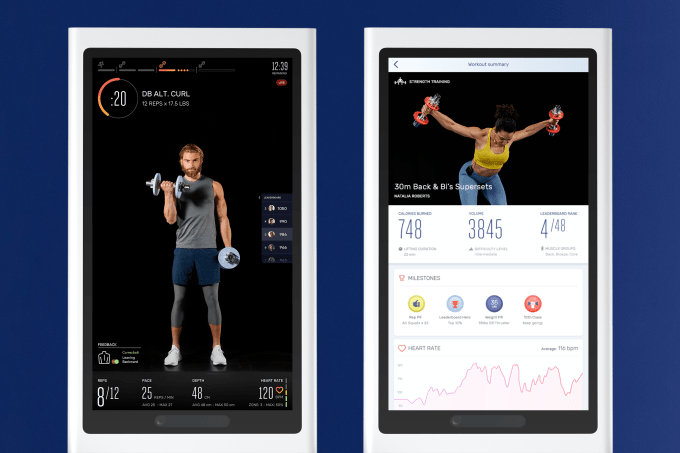
“Every single product in the market took a piece of equipment out of a gym and slapped a screen on it” says Tempo CEO and co-founder Moawia Eldeeb. “You need to be able to see a user to actually be able to give them guidance so they can work out safely. We wanted to build a fitness experience from the ground up with training and form feedback at the core of it.”
I demo’d Tempo this week and found the in-home convenience, motivational on-screen personal trainers, and the real-time posture corrections gave me the confidence to lift weights without the fear of injury. It might not feel quite as fun and addictive as Peloton, but it offers a facsimile of personal training that’s more affordable than in-person classes that cost $100 or more.
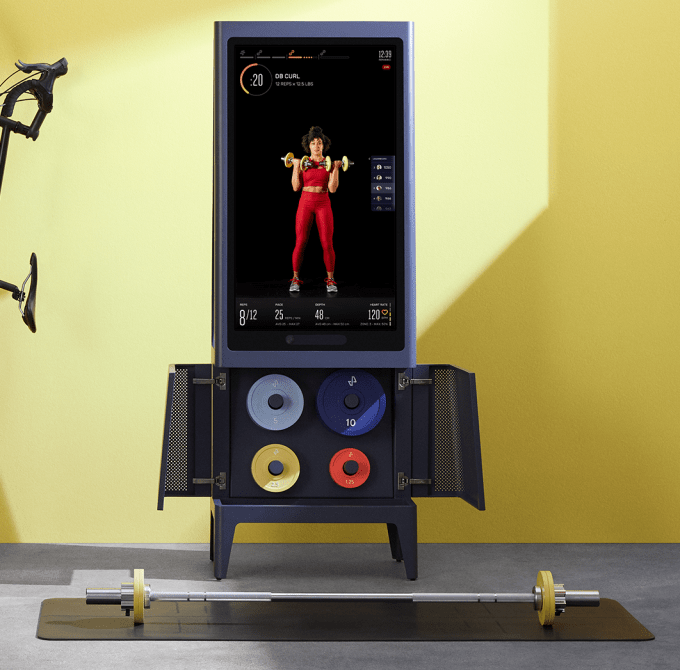
The idea of democratizing access to trainers is what convinced Eldeeb and the Tempo team to stretch its initial $1.8 million in seed funding for four years. While collecting data from its SmartSpot in-gym weight lifting assessment device, Tempo survived long enough to build this prototype.
“Most investors had given up on us. We built this product and had just $700,000 left” Eldeeb recalls. But once people could try Tempo, “we pitched 10 investors and got 9 term sheets. It got very competitive.” The startup recently walked away with a $17.5 million Series A round from Founders Fund, DCM, and Khosla Ventures. Now Tempo will pour that cash into marketing, retail distribution, R&D, and content production.

Tempo co-founder, CEO, and CPO Moawia Eldeeb
Tempo’s mission is to change people’s lives for the better like personal training did for Eldeeb. “Training is what took me out of a homeless shelter and got me to where I am I today” he reflects.
At one point, Eldeeb was living in a shelter without even a middle school education. But personal trainers at a local YMCA took him under their wing. He eventually paid his way through Columbia University by working as a personal trainer to his eventual co-founder and CTO Josh Augustin. “Having trainers say you’re getting stronger taught me I could do something for myself.”
While at school, Eldeeb was developing an idea for a physical therapy wearable while Augustin was building 3D sensors for guiding robot perception. They soon realized that a combination of these ideas “offered us the possibility to deliver on the promise of guiding your form and tracking your progress accurately.”
In 2015, they started a company called Pivot to build SmartSpot — a similar looking upright screen that was designed for gyms. It could track users, but only output raw data about their form, like how bent a user’s knees were during a squat. It then worked with trainers to annotate the data to determine what movement patterns were safe and which were dangerous.
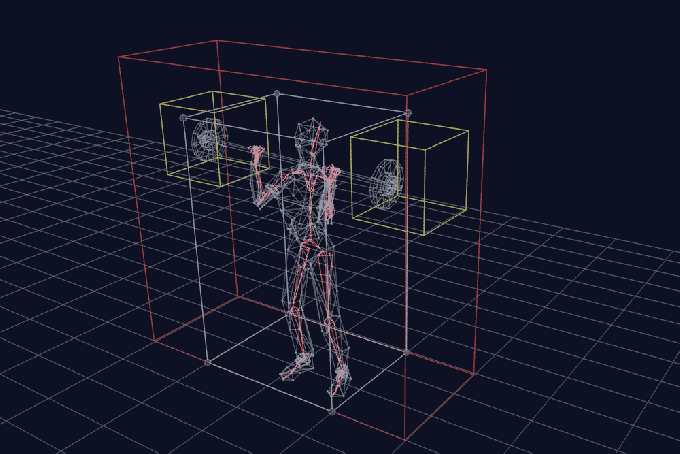
Gym owners bought in because it let them track which trainers were actually helping customers improve. “It held trainers accountable. If you weren’t delivering results, it’d be obvious” Eldeeb tells me. The company built up a dataset of over from over 1 million 3D tagged workouts, from hundreds of gyms, overseen by thousands of trainers. That formed the basis of the artificial intelligence that would let Pivot pivot into Tempo.
At first, Tempo’s giant screen and black or white armoire can feel a bit daunting. The thing is about six feet tall, though it only takes up as much room as a large chair. It makes efficient use of space, with the barbell and dumbbells racked on the back, an internal shelf for the foam roller and mat, and a soft-closing cabinet on the front with the rubber-coated weight set. Keeping everything together means you won’t have to go digging in your closet to start a work out.
Tempo walks users through an initial computer-vision fitness assessment to understand your strength and flexibility so it can set base levels for its exercises. If you have an injury it needs to nurse, Tempo connects you to a human personal trainer that helps customize your workout plan. Otherwise, it uses your goals and data to set out a progressive regimen that gets a little tougher each day. It even blocks you from jumping into later classes so you don’t strain yourself.
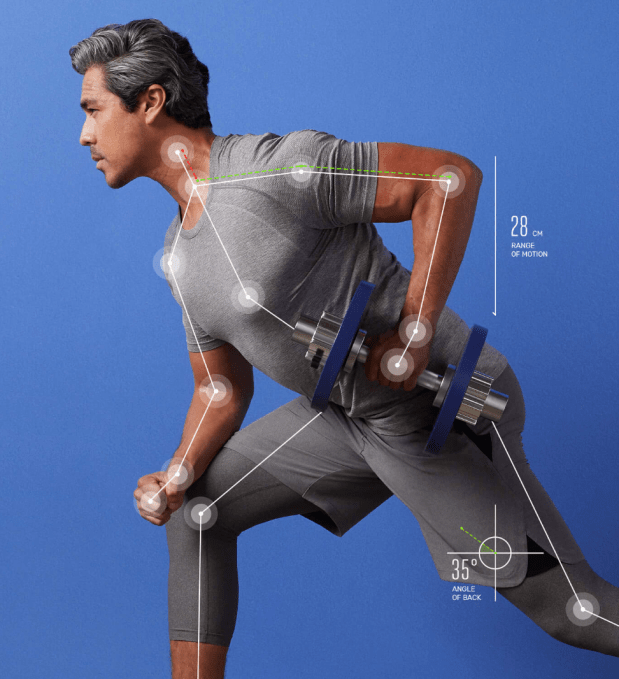
Your workout plan begins with tutorial sessions that teach you to do the exercises with safe and proper form. When I was hunching forward during my squats, Tempo’s computer vision would ding me with instant feedback to keep my knees back and chest up. Then once I’d corrected the issue, it congratulated me with little green checkmarks. “Any product that doesn’t offer that is no better than a DVD or YouTube videos” Eldeeb remarks.
From there I could choose between a variety of class styles and lengths, ranging from high intensity interval training circuits to isolated sessions focused on particular muscle groups. In each, you watch a near life-size personal trainer doing the routines right in front of you while they demonstrate form and drop inspirational quotes.
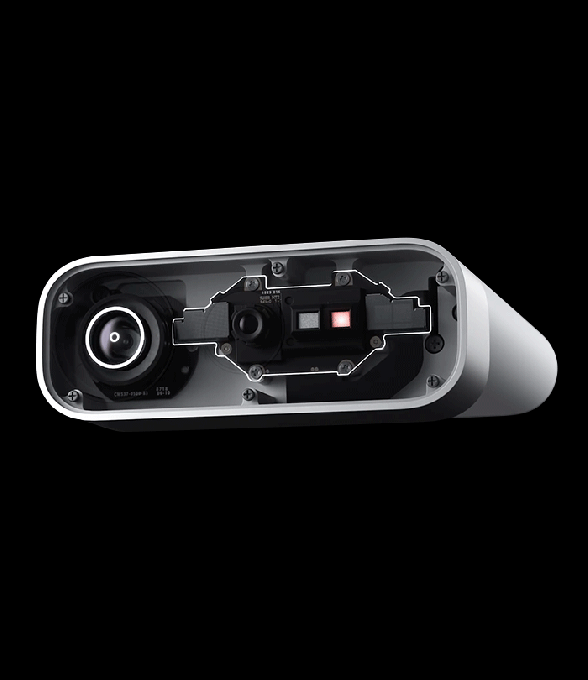
Tempo is producing seven live classes per day from its San Francisco studio which you can also watch on-demand. You can compete against friends or strangers, and Tempo compares you rep for rep so it’s more about perfect form than reckless speed or weight. The live trainers can actually see all your data and your mistakes on a dashboard as they lead classes, and can call you out for screwing up (though you can deactivate this shame mode). Eldeeb says “knowing the trainer can possibly see your numbers will motivate you to actually do this right.”
The class selection interface is suspiciously similar to Peloton’s, though that at least will make it familiar for some. Over time, you build up an immense collection of data on your performance in each work out, excercise, and muscle. Unlike hitting the gym by yourself, you’ll never struggle to remember how much weight to use or whether you’re improving. Classes are soundtracked with dancey remixes, perhaps to avoid the royalty issues with original songs that slapped Peloton.
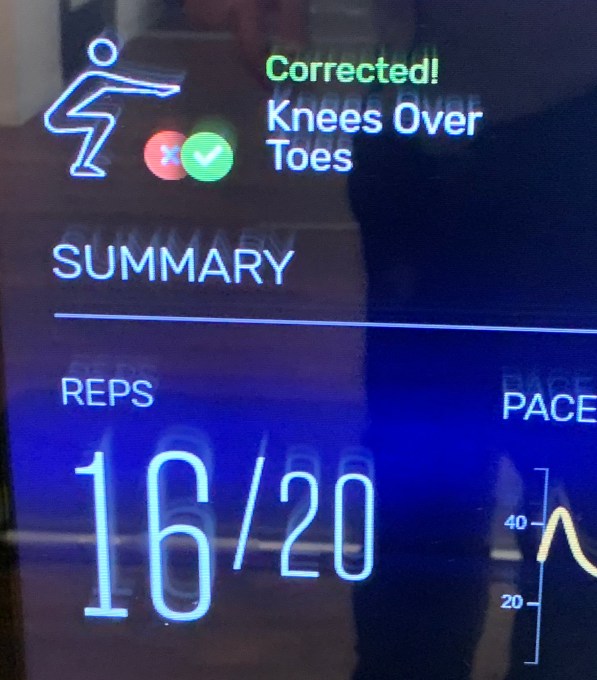
Tempo gives feedback when you’re doing exercises wrong, and when you correct yourself
For a 14-person startup, Tempo is trying to do a ton and that can leave some rough edges. The bluetooth armband heartrate monitor can have connectivity issues and the computer vision doesn’t always register every rep, especially if your posture is off. Classes also fail to include enough stretching to prevent strains, instead devoting the start of classes to warmups that ease you in but might not protect your muscles well enough. My quads were destroyed after my demo.
Tempo still achieves its primary objective: it makes weight lifting accessible. No need to drag yourself to the gym or be beholden to a trainer’s schedule, where I’d always end up arriving late and wasting 25% of my session. The form feedback fixes my core complaint about remote personal training app Future I’ve been using for nine months, which can’t see you. That’s led to minor injuries from bad sit-up posture and other incorrect movements. Tempo can’t catch everything, but it can nip some of the most common mistakes in the bud.
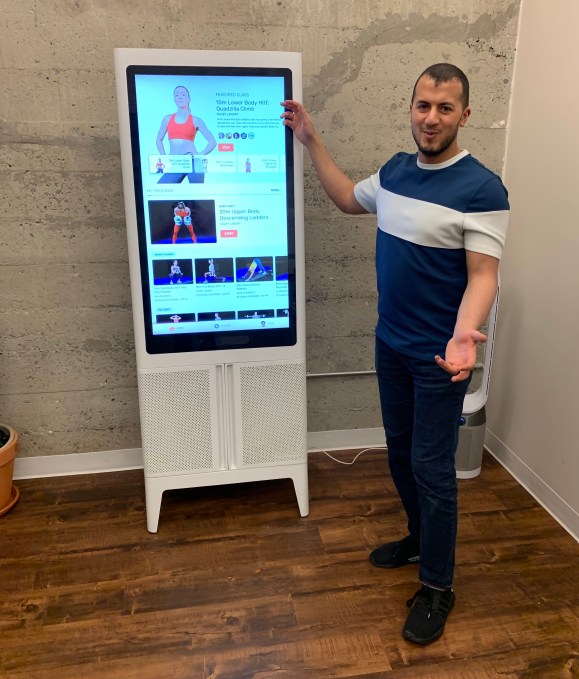
Eldeeb was blunt when asked why Tempo is better than well-funded competitors like Tonal’s wall-mounted resistance cable-based training system or the Mirror’s massive screen.
“The biggest problem with Tonal is two-fold. Cables and motors do not last. I want this product to be in your house for 10-plus years. [Tempo] is in gyms running 24/7 in for 3 years and it’s still working. The second biggest thing is just feedback.” While Tonal does include a camera and microphone it might employ in the future, it’s not scanning you to detect when you’re lifting weights crooked like Tempo.
As for Mirror, “What is the difference between ClassPass Live and Mirror? It doesn’t come with any equipment, and there’s no training. It’s just a two-way mirror and a Samsung LED panel behind it with an arduino board” Eldeeb rails. He claims it can’t actually monitor your workouts and that his team’s tests found Mirror would say they’d burned 500 calories when they were literally just sitting on their couch in front of it.
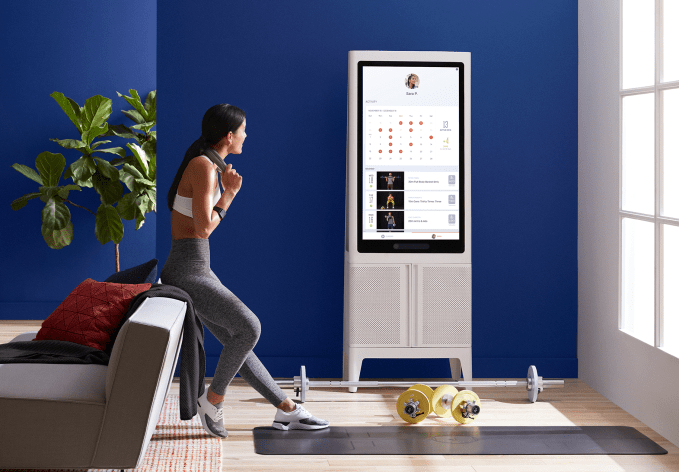
If the software proves to have high retention so people actually recommend Tempo to friends, the biggest hurdle will be its price. You can buy a couple dumbbells for $50 or get a barbell weight bench for a few hundred. Even if Tempo’s $55 per month financing option plus $39 subscription makes it cheaper than a single personal training session or on-par with a gym membership, it could still seem like a serious commitment.
That feeling is magnified by how all of its equipment and classes and data can feel a bit overwhelming. The startup might have to spend a fortune on retail establishments that can guide users through their first Tempo experience. There’s also no mobile version yet, so you can’t bring the work outs on the road with you.
For those comfortable lifting the cheap weights they have at home or hitting up a budget gym, Tempo might seem needlessly overwrought and expensive. But for anyone who needs more instruction or wants to get a Barry’s Bootcamp-worthy workout at home, Tempo might be just their speed.
 from eCommerce – TechCrunch https://ift.tt/2T3F3qS
from eCommerce – TechCrunch https://ift.tt/2T3F3qS via IFTTT
via IFTTT
We’ve are all waking up to a new Government today, with the Labour party about to take control of the country and what should be top of your...
